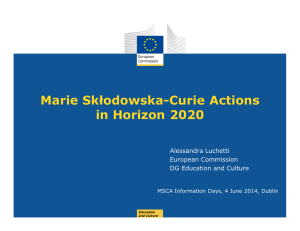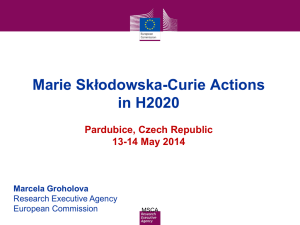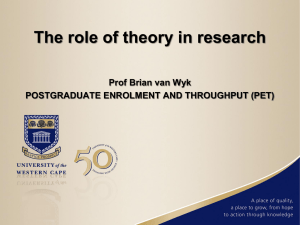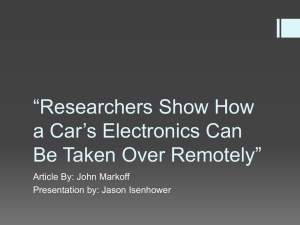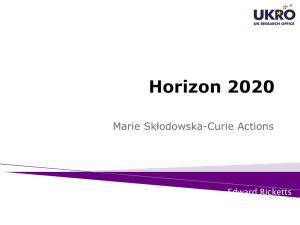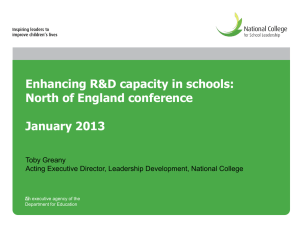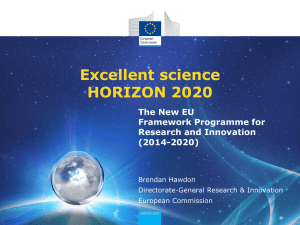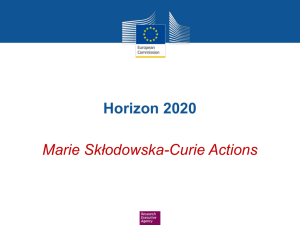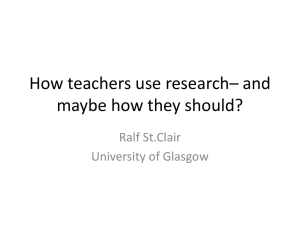MSCA
advertisement
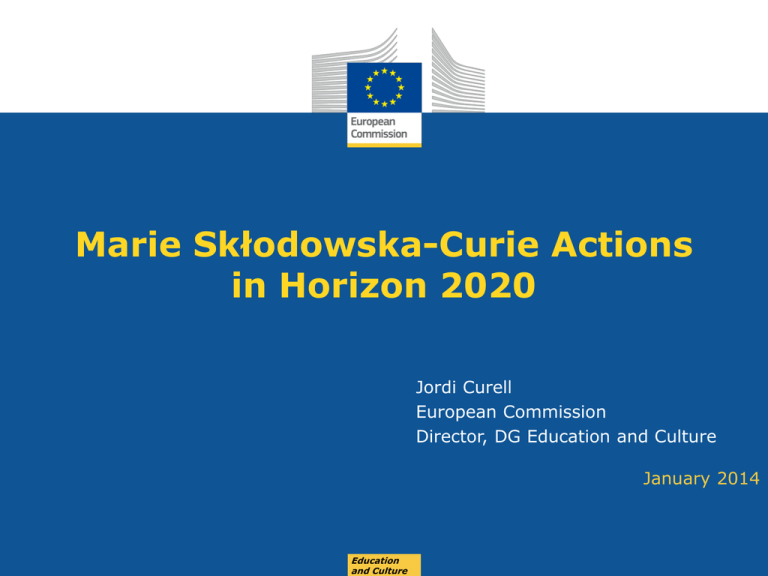
Marie Skłodowska-Curie Actions in Horizon 2020 Jordi Curell European Commission Director, DG Education and Culture January 2014 Education and Culture Date: in 12 pts MSCA Excellence Research Training Skills Mobility Education and Culture MSCA MSCA Objective Ensure the optimum development and dynamic use of Europe’s intellectual capital in order to generate new skills, knowledge and innovation Budget 2014-2020: 6 162 million € Education and Culture Key features Open to all domains of research and innovation from basic research up to market take-up and innovation services Entirely bottom-up Participation of non-academic sector strongly encouraged, especially industry and SMEs Mobility as the key requirement - funding on condition participants move from one country to another Promotion of attractive working and employment conditions Particular attention to gender balance Public engagement of supported researchers 2014-2015: 10 calls foreseen -> one call per each MSC action per year + one call covering 2 years of European Researchers' Night + NCP Education and Culture Strategic programming approach Attract and retain research talent Develop state-of-the-art, innovative training schemes, consistent with the highly competitive and increasingly inter-disciplinary requirements of research and innovation Promote sustainable career development in research and innovation Focus on delivering new knowledge and skills, in line with the key driver identified in the strategic programming approach Contribute to a strong partnership with MS via the cofunding mechanism Education and Culture Activities MSCA in H2020 Innovative Training Networks Individual Fellowships Research and Innovation Staff Exchange Co-funding of programmes ITN Doctoral and initial training IF Support for experienced researchers undertaking international and inter-sector mobility RISE International and inter-sector cooperation through the exchange of staff COFUND Co-funding of regional, national and international programmes: - doctoral programmes - fellowship programmes Support and policy actions European Researchers' Night (NIGHT) NCP support Non call-based activities Definitions Academic sector: public or private HEI awarding academic degrees, public or private non-profit research organisations, international European interest organisations Non-academic sector: any socio-economic actor not included in the academic sector definition Beneficiaries => signatories of the grant agreement Partner organisations => not signing the grant agreement Categories of researchers: ESR and ER – in line with FP7 approach Full time research equivalent and mobility rule – following FP7 approach Staff members in RISE: researchers, managers, administrative and technical personnel supporting research and innovation activities of the project Education and Culture Innovative Training Networks (ITN) MSCA - main EU programme for structured doctoral training Objective raise excellence and structure research and doctoral training train a new generation of creative, entrepreneurial and innovative earlystage researchers Scope European Training Networks (ETN), European Industrial Doctorates (EID) or European Joint Doctorates (EJD) Triple 'i' dimension of mobility and particular focus on innovation skills Expected Impact structure research and doctoral training in Europe trigger cooperation and exchange of best practice among participants enhance researchers' employability and provide them with new career perspectives Education and Culture ITN – Main features Budget: € 405.18 Million in 2014 (EID: 25.5 Mio, EJD: 30 Mio) € 370 Million in 2015 (EID: 25 Mio, EJD 28 Mio) Duration of projects: maximum 4 years Consortium agreement: required only for EID Support to early-stage researchers only Fellowships of 3-36 months Maximum 540 researcher-months per consortium (180 for EID with 2 partners) Separate multidisciplinary panels for EID and EJD Education and Culture ITN - consortia Country 1 Academia Non-academia Country 1 Academia Non-academia Academia Non-academia Academia Academia Non-academia Academia Academia Non-academia Non-academia Country 3 Country 2 European Training Networks Academia Academia Country 3 Country 2 European Joint Doctorates Academia Non-academia ≥ 50% Non-academia Academia European Industrial Doctorates Nonacademia Academia Country 1 Education and Culture Country 2 Award criteria: ITN Excellence Impact Implementation Quality, innovative aspects and credibility of the research programme (including inter/multidisciplinary and intersectoral aspects) Enhancing research- and innovation-related human resources, skills, and working conditions to realise the potential of individuals and to provide new career perspectives Overall coherence and effectiveness of the work plan, including appropriateness of the allocation of tasks and resources (including awarding of the doctoral degrees for EID and EJD projects) Quality and innovative aspects of the training programme Contribution to structuring doctoral / early-stage research training at the European level and to strengthening European innovation capacity, including the potential for: Appropriateness of the management structures and procedures, including quality management and risk management (with a mandatory joint governing structure for EID and EJD projects) (including transferable skills, inter/multidisciplinary and intersectoral aspects) a) meaningful contribution of the non-academic sector to the doctoral/research training, as appropriate to the implementation mode and research field b) developing sustainable joint doctoral degree structures (for EJD projects only) Quality of the supervision (including mandatory joint supervision for EID and EJD projects) Effectiveness of the proposed measures for communication and dissemination of results Quality of the proposed interaction between the participating organisations Appropriateness of the infrastructure of the participating organisations Competences, experience and complementarity of the participating organisations and their commitment to the programme Education and Culture Individual Fellowships (IF) Objective enhance the creative and innovative potential of experienced researchers provide opportunities to acquire new knowledge, work on research projects in a European context or outside Europe, resume a career or return to Europe Scope Individual, trans-national fellowships awarded to the best or most promising researchers European Fellowships or Global Fellowships Career Restart Panel and Reintegration Panel Expected Impact release the full potential of researchers and to catalyse significant development in their careers in both the academic and non-academic sectors strengthen the contact network of the researcher and the host organisation Education and Culture IF – Main features Budget: € 240.50 Million in 2014 (Global Fellowships: 29 Mio) € 213 Million in 2015 (Global Fellowships: 27 Mio) Duration of projects: 2 years (IF Global: 3 years) Support to experienced researchers of any nationality (IF Global and IF Reintegration: nationals of EU MS/AC and long-term residents) Focus on career development, not necessarily experience Additional 3 or 6 month secondment option, within Europe and in another sector Separate multidisciplinary panels for CAR and Reintegration Same elements of award criteria for all proposals Education and Culture IF – European and Global European Fellowships Global Fellowships Education and Culture Award criteria: IF Excellence Quality, innovative aspects and credibility of the research (including inter/multidisciplinary aspects) Clarity and quality of transfer of knowledge/training for the development of researcher in light of the research objectives Impact Implementation Enhancing research- and innovation-related Overall coherence and effectiveness human resources, skills and working of the work plan, including conditions to realise the potential of appropriateness of the allocation of tasks individuals and to provide new career and resources perspectives Effectiveness of the proposed measures for communication and results dissemination Appropriateness of the management structures and procedures, including quality management and risk management Quality of the supervision and the hosting arrangements Appropriateness of the institutional environment (infrastructure) Capacity of the researcher to reach or reenforce a position of professional maturity in research Competences, experience and complementarity of the participating organisations and institutional commitment Education and Culture Research and Innovation Staff Exchange (RISE) Objective promote international and inter-sector collaboration through research and innovation staff exchanges foster a shared culture of research and innovation Scope International and inter-sector transfer of knowledge and sharing of ideas Common research and innovation project Highly skilled research and innovation staff Within Europe: only inter-sector secondments No secondments between institutions located outside Europe or within the same MS/AC Expected Impact strengthen the interaction between organisations in the academic and nonacademic sectors, and between Europe and third countries Education and Culture RISE – Main features Budget: € 70 Million in 2014 € 80 Million in 2015 Duration of projects: maximum 4 years Minimum eligibility condition: participants in 3 different countries (at least 2 MS/AC) Partnership agreement recommended Support to secondments of staff members (1-12 months) No mobility rule required Eligibility condition for staff member: 6 month at the sending institution prior to the first secondment Maximum 540 researcher-months per consortium 8 evaluation panels Education and Culture RISE – Exchanges MS/AC MS/AC Academia Academia Nonacademia Nonacademia Education and Culture TC Academia Nonacademia Award criteria: RISE Excellence Impact Implementation Quality, innovative aspects and credibility of the research (including inter/multidisciplinary aspects) Enhancing research- and innovation-related human resources, skills and working conditions to realise the potential of individuals and to provide new career perspectives Overall coherence and effectiveness of the work plan, including appropriateness of the allocation of tasks and resources Clarity and quality of knowledge sharing among the participants in light of the research and innovation objectives. To develop new and lasting research collaborations, to achieve transfer of knowledge between research institutions and to improve research and innovation potential at the European and global levels Appropriateness of the management structures and procedures, including quality management and risk management Quality of the interaction between the participating organisations Effectiveness of the proposed measures for communication and results dissemination Appropriateness of the institutional environment (infrastructure) Competences, experience and complementarity of the participating organisations and institutional commitment Education and Culture COFUND MSCA to foster excellence throughout Europe Objective stimulate regional, national or international programmes to foster excellence in researchers' training, mobility and career development Scope international, intersectoral and interdisciplinary research training, as well as transnational and cross-sector mobility of researchers possibilities of synergies with structural funds opportunities for researchers from all countries researchers to comply with the mobility rules of the MSCA open and transparent selection and recruitment Expected Impact exploit synergies between EU actions and those at regional, national, and international level leverage funding and combat fragmentation increase working / employment conditions of researchers Education and Culture COFUND Mono-beneficiary Legal entities established in MS or AC or international European interest organisations that fund or manage doctoral programmes or fellowship programmes for researchers. Fellowship Programmes Doctoral Programmes Education and Culture COFUND – Main features Budget: € 80 Million in 2014 (Doctoral Programmes: 30 Mio) € 80 Million in 2015 (Doctoral Programmes: 30 Mio) Maximum € 10 Million per single applicant per call Duration of projects: maximum 5 years Researchers recruited for minimum 3 months EU unit cost contribution to living allowances for researchers and management costs Minimum living allowance fixed in the WP Education and Culture COFUND – synergies Synergies with European Structural and Investment Funds (ESIF) Support regional policies by internationalisation of human resources in research Possibility to support programmes that prioritise specific scientific disciplines based on smart specialisation strategies Cost items other than living allowance and management (such as research costs, travel and mobility allowances, overheads) may be funded through other resources including EU programmes other than Horizon 2020 (e.g. ESIF) Education and Culture Award criteria: COFUND Excellence Impact Implementation Quality of the selection / recruitment process for the researchers (transparency, composition and organisation of selection committees, evaluation criteria, equal opportunity) Enhancing research- and innovation-related human resources, skills and working conditions to realise the potential of individuals and to provide new career perspectives Overall coherence, effectiveness and appropriateness of the work plan Quality of the research options offered by the programme in terms of science, interdisciplinarity, intersectorality and level of transnational mobility Impact of the programme on aligning practices at participating organisations with principles set out by the EU for the human resources development in research and innovation Appointment conditions of researchers Quality of career guidance and training, including supervision arrangements, training in transferable skills Effectiveness of the proposed measures for communication and results dissemination of the programmes Competence of the participant to implement the programme Education and Culture EU contribution – eligibility Categories of eligible costs Marie SkłodowskaCurie action ITN IF RISE COFUND Costs of researchers/seconded staff member (1) Institutional costs (2) Living allowance (a) Mobility allowance (b) Family allowance (c) Top-up allowance (d) Research, training and networking costs (a) Management and indirect costs (b) Unit cost per person/month Unit cost per person/month Unit cost per person/month Ineligible Unit cost per person/month Unit cost per person/month Unit cost per person/month Unit cost per person/month Unit cost per person/month Ineligible Unit cost per person/month Unit cost per person/month Ineligible Ineligible Ineligible Unit cost per person/month Unit cost per person/month Unit cost per person/month Unit cost per person/month (one for earlystage researchers and one for experienced researchers) Ineligible Ineligible Ineligible Ineligible Unit cost per person/month (indirect costs not covered) Education and Culture EU contribution – amounts Categories of eligible costs Marie SkłodowskaCurie action ITN (100%) IF (100%) RISE (100%) COFUND (50%) Costs of researchers/seconded staff member (1) Institutional costs (2) Living allowance (a) Mobility allowance (b) Family allowance (c) Top-up allowance (d) Research, training and networking costs (a) Management and indirect costs (b) 3 110 600 500 -- 1 800 1 200 4 650 600 500 -- 800 650 -- -- -- 2 000 1 800 700 ESR: 3 710 ER: 5 250 -- -- -- -- 650 Education and Culture COFUND – EU contribution EU contribution to living allowance for contracts with full social security: • Experienced researchers (ER): € 2625 per person-month Minimum amounts for monthly living + mobility allowances: • • Early stage researchers (ESR): € 1855 per person-month EU contribution to management costs: € 325 per person-month • ESR: € 2597 ER: € 3675 Other cost items may be funded through other resources (including ESIF funds) Example (Fellowship programme – ER) Cost item Living allowance Total cost [€ per person-month] 4800 Mobility allowance 500 Research costs 500 Management costs 600 Indirect costs 600 Total Education and Culture 7000 EU contribution [€ per person-month] 2625 325 2950 NIGHT Objective bring researchers closer to the general public increase awareness of research and innovation activities Scope yearly event, typically on the last Friday of the month of September focus on the general public, addressing and attracting people regardless of the level their scientific background special focus on pupils and students promotion of the European dimension and gender balance in research and innovation involvement of researchers funded by Horizon 2020 Expected Impact raise awareness of the importance of research careers in the long term, encourage young people to embark on scientific careers Education and Culture NIGHT – Main features Budget: € 8 Million in 2014 (2 editions covered) Call under Coordination and support action Maximum 100% funding Duration: maximum 2 years (option for one edition only) Beneficiaries: any legal entity in the EU Member States and Associated Countries Consortium agreement not required Education and Culture NCP call Budget: € 1.5 Million in 2014 Call under Coordination and support action Maximum 100% funding Duration: maximum 3 years A single proposal expected Proposal can include NCP host organisations from the EU Member States, Associated Countries and third countries Education and Culture Non call-based activities Expert evaluators: > € 20 million (2014 and 2015 budgets) EU Presidencies events (Italy and Luxembourg) Studies: dual careers, career restart, industrial doctorates, outreach activities – benchmark for NIGHT MSCA Alumni services (> € 1 million (2014 and 2015 budgets) Dissemination and communication – horizontal activities for H2020 Education and Culture Call deadlines 2014 Call ID Call Opens Call Deadline Budget (Mio EUR) H2020-MSCA-ITN-2014 11-12-2013 09-04-2014 405.18 H2020-MSCA-IF-2014 12-03-2014 11-09-2014 240.50 H2020-MSCA-RISE-2014 11-12-2013 24-04-2014 70.00 H2020-MSCA-COFUND-2014 10-04-2014 02-10-2014 80.00 H2020-MSCA-NIGHT-2014 11-12-2013 04-03-2014 8.00 H2020-MSCA-NCP-2014 11-12-2013 02-04-2014 1.50 Education and Culture Call deadlines 2015 Call ID Call Opens Call Deadline Budget (Mio EUR) H2020-MSCA-ITN-2015 02-09-2014 13-01-2015 370.00 H2020-MSCA-IF-2015 12-03-2015 10-09-2015 213.00 H2020-MSCA-RISE-2015 06-01-2015 28-04-2015 80.00 H2020-MSCA-COFUND-2015 14-04-2015 01-10-2015 80.00 Education and Culture More information about MSCA funding at the Participant Portal http://ec.europa.eu/research/participants/portal/ http://ec.europa.eu/research/participants/portal/doc/call/h2020/co mmon/1587755-03._msca_calls_wp2014-2015_en.pdf Martin.Lange@ec.europa.eu Education and Culture
